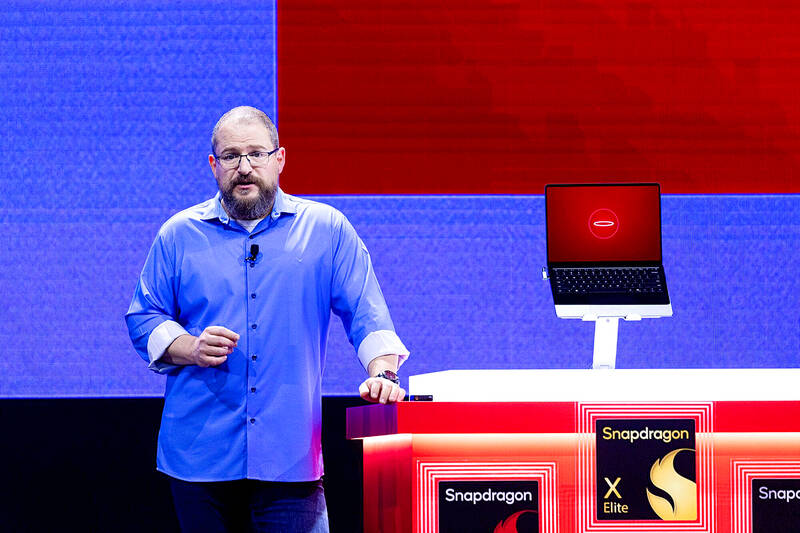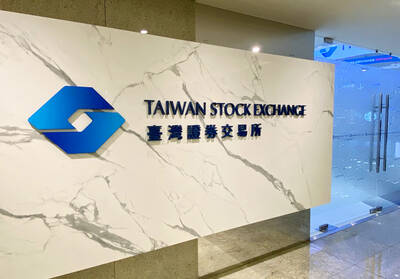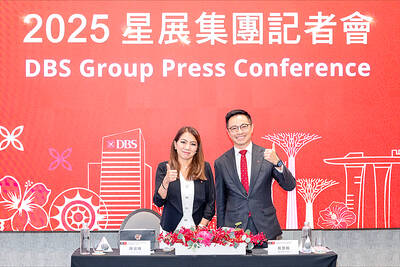Qualcomm Inc chief executive officer Cristiano Amon on Friday said Intel Corp’s production technology is not good enough for the maker of mobile phone processors to use as a supplier.
If Intel is able to advance its manufacturing techniques to produce more efficient chips, then Qualcomm would consider becoming a customer, Amon said in an interview on Bloomberg Television’s Bloomberg Tech.
“Intel is not an option today,” Amon said. “We would like Intel to be an option.”

Photo: Annabelle Chih, Bloomberg
Instead, the CEO said Qualcomm would stick with current producers Taiwan Semiconductor Manufacturing Co (TSMC, 台積電) and Samsung Electronics Co.
Qualcomm is a designer of chips that, like most of the industry, relies on outsourced production. Intel, formerly the world’s largest chipmaker, is trying to turn around its fortunes by attracting outside customers, such as Qualcomm, in addition to manufacturing its own designs.
The San Diego, California-based company, which gets the majority of its revenue from selling processors that are the heart of Android smartphones, is undergoing its own transformation, but from a stronger base than Intel, which is facing shrinking sales.
Under Amon, Qualcomm is pushing its mobile technology into new markets, such as automotive, seeking revenue growth that does not depend on a smartphone boom.
It has told investors it could secure US$22 billion in revenue from automotive and connected devices by 2029.
Earlier on Friday, the company announced it has developed a self-driving product that is going into BMW AG’s newly announced iX3 sports utility vehicle.
Unlike other chipmakers that made claims about the impending takeover of the automotive industry by autonomous systems, Qualcomm has pursued a more measured approach. The company took its time to develop a strong position in chips that support information and entertainment systems inside vehicles. It is now leveraging relationships to spread its reach into technology that would eventually take the role of the driver.
The new system going into BMW vehicles has the advantage of bringing powerful computing — as much as a data center server — yet requires relatively little power, Amon said.
The new Snapdragon Ride Pilot offering can be scaled down to basic driver assistance or up to take over most of the driving functions, Amon said.
Even powerful systems would not suck the life out of batteries needed to keep cars rolling as far as they can between recharges.
“We design all of our chips assuming there’s a battery on the other side, not plugged into the wall,” he said. “You have all the computing power and you still get incredible range.”

Taiwan Semiconductor Manufacturing Co (TSMC, 台積電) secured a record 70.2 percent share of the global foundry business in the second quarter, up from 67.6 percent the previous quarter, and continued widening its lead over second-placed Samsung Electronics Co, TrendForce Corp (集邦科技) said on Monday. TSMC posted US$30.24 billion in sales in the April-to-June period, up 18.5 percent from the previous quarter, driven by major smartphone customers entering their ramp-up cycle and robust demand for artificial intelligence chips, laptops and PCs, which boosted wafer shipments and average selling prices, TrendForce said in a report. Samsung’s sales also grew in the second quarter, up

LIMITED IMPACT: Investor confidence was likely sustained by its relatively small exposure to the Chinese market, as only less advanced chips are made in Nanjing Taiwan Semiconductor Manufacturing Co (TSMC, 台積電) saw its stock price close steady yesterday in a sign that the loss of the validated end user (VEU) status for its Nanjing, China, fab should have a mild impact on the world’s biggest contract chipmaker financially and technologically. Media reports about the waiver loss sent TSMC down 1.29 percent during the early trading session yesterday, but the stock soon regained strength and ended at NT$1,160, unchanged from Tuesday. Investors’ confidence in TSMC was likely built on its relatively small exposure to the Chinese market, as Chinese customers contributed about 9 percent to TSMC’s revenue last

Taiwan and Japan will kick off a series of cross border listings of exchange-traded funds (ETFs) this month, a milestone for the internationalization of the local ETF market, the Taiwan Stock Exchange (TWSE) said Wednesday. In a statement, the TWSE said the cross border ETF listings between Taiwan and Japan are expected to boost the local capital market’s visibility internationally and serve as a key for Taiwan becoming an asset management hub in the region. An ETF, a pooled investment security that is traded like an individual stock, can be tracked from the price of a single stock to a large and

Despite global geopolitical uncertainties and macroeconomic volatility, DBS Bank Taiwan (星展台灣) yesterday reported that its first-half revenue rose 10 percent year-on-year to a record NT$16.5 billion (US$537.8 million), while net profit surged 65 percent to an unprecedented NT$4.4 billion. The nation’s largest foreign bank made the announcement on the second anniversary of its integration with Citibank Taiwan Ltd’s (花旗台灣) consumer banking business. “Taiwan is a key market for DBS. Over the years, we have consistently demonstrated our commitment to deepening our presence in Taiwan, not only via continued investment to support franchise growth, but also through a series of bolt-on acquisitions,” DBS